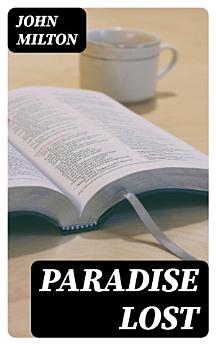Paradise Lost
سبتمبر 2022 · DigiCat
كتاب إلكتروني
209
صفحة
family_home
مؤهل
info
reportلم يتم التحقّق من التقييمات والمراجعات. مزيد من المعلومات
معلومات عن هذا الكتاب الإلكتروني
John Milton's "Paradise Lost" is an epic poem that meticulously explores the biblical story of the Fall of Man, blending classical literary techniques with profound theological inquiry. Composed in blank verse, this monumental work unfolds through a grand narrative that delves into themes of free will, obedience, and the struggle between good and evil. Rich in allegory and symbolism, Milton employs vivid characterizations of iconic figures such as Satan, Adam, and Eve to convey the complexities of human nature and divine justice, thereby situating his work in the context of the Renaissance's burgeoning interest in individual agency and moral philosophy. John Milton, a prolific writer and staunch advocate for personal liberties, drew from his own experiences of political upheaval and religious turbulence in 17th-century England. Influenced by the Civil War and his subsequent loss of sight, Milton's fervent belief in the role of divine providence and human choice informs the narrative structure and moral underpinnings of "Paradise Lost." His background as a scholar and his deep engagement with both classical and biblical texts lend the poem an intellectual depth that reflects the era's cumulative knowledge. "Paradise Lost" is a must-read for those seeking to encounter a profound meditation on existential questions that resonate throughout time. Milton's deft intertwining of poetic mastery and philosophical inquiry invites readers to reflect on their own beliefs and the human condition, offering a rich tapestry of language and thought that continues to inspire readers, scholars, and theologians alike.
نبذة عن المؤلف
John Milton (1608–1674) was an English poet, polemicist, man of letters, and civil servant for the Commonwealth of England under Oliver Cromwell. He is best known for his epic poem 'Paradise Lost' (1667), considered one of the greatest works of English literature and a hallmark of the blank verse epic form. Milton's writing is characterized by its grand style, complex syntax, and rich allusions to classical mythology, contemporary religious and political issues, and his own erudite scholarship. Born in London to a prosperous family, Milton was educated at St Paul's School and Christ's College, Cambridge. A proponent of republicanism and a fierce critic of the monarchy, he also authored a number of pamphlets on religious and political subjects, including advocating for the abolition of the Church of England and the justification of the regicide of King Charles I. His later works, written after his blindness around 1652, dealt with themes of sin, redemption, and human understanding, and included not only 'Paradise Lost' but also its sequel 'Paradise Regained' and the tragedy 'Samson Agonistes.' Milton's influence extends beyond literature; his defense of freedom of the press and individual conscience has echoed into modern liberal thought. His literary contributions are immortalized in his profound exploration of the human condition, the complexity of sin and redemption, and the eternal struggle for truth and justice.
تقييم هذا الكتاب الإلكتروني
أخبرنا ما هو رأيك.
معلومات القراءة
الهواتف الذكية والأجهزة اللوحية
ينبغي تثبيت تطبيق كتب Google Play لنظام التشغيل Android وiPad/iPhone. يعمل هذا التطبيق على إجراء مزامنة تلقائية مع حسابك ويتيح لك القراءة أثناء الاتصال بالإنترنت أو بلا اتصال بالإنترنت أينما كنت.
أجهزة الكمبيوتر المحمول وأجهزة الكمبيوتر
يمكنك الاستماع إلى الكتب المسموعة التي تم شراؤها على Google Play باستخدام متصفح الويب على جهاز الكمبيوتر.
أجهزة القراءة الإلكترونية والأجهزة الأخرى
للقراءة على أجهزة الحبر الإلكتروني، مثل أجهزة القارئ الإلكتروني Kobo، عليك تنزيل ملف ونقله إلى جهازك. يُرجى اتّباع التعليمات المفصّلة في مركز المساعدة لتتمكّن من نقل الملفات إلى أجهزة القارئ الإلكتروني المتوافقة.








